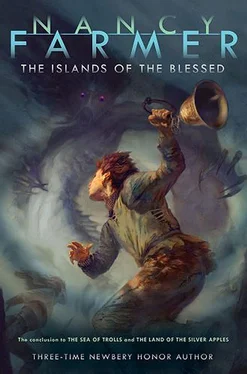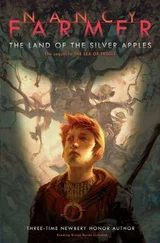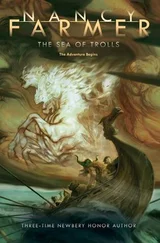After a while Jack crawled out and retrieved the staff. “I smell flowers,” murmured Thorgil. He sniffed. Incredibly, so did he. Outside, the winter storm raged and water poured past them on either side, but inside it was spring. “If I die…” the shield maiden said. Her voice was so low, Jack could barely hear it.
“Hush. You’re going to recover,” he said.
Thorgil swallowed. It was evidently very painful to talk. “I’ll go to Hel.”
Jack was shocked. He knew that Northmen who died of illness were supposed to be condemned to the same afterlife as oath-breakers. It was dismaying that Thorgil still believed it after learning the truth about Valhalla. “You are absolutely not going to Hel,” he said. “The Bard said we get to choose our afterlife. If it were up to me, I’d choose the Islands of the Blessed. That’s where your mother went.”
“Mother,” whispered Thorgil.
Jack racked his brain to think of something that would comfort her. “You know, I never told you the poem I wrote about your battle with Garm, the hound of Hel,” he said. “It’s called ‘Thorgil Silver-Hand’.”
She stirred in his arms. “Truly?”
“It’s the best thing I ever did and will be sung in halls forever after. It goes like this….” Jack hadn’t the slightest idea what words would come out of his mouth, but he needn’t have worried. The same marvelous feeling came over him as when he’d recited the lorica in Bebba’s Town. In fact, the poem was a lorica, only a very long one. And it was the best thing he’d ever done, right up there with the Bard’s “Beowulf”.
There wasn’t a single word that was not beautiful and inspiring. It told of Thorgil Silver-Hand, who was put out for wolves to devour when she was born, but the royal dog Maeve rescued her. Many were the battles and adventures of Thorgil Silver-Hand. She fought a dragon even as it was carrying her to its nest to feed its young. She slew a giant eagle when it attacked her on the ice bridge to the Mountain Queen’s palace. She fought the hound of Hel to save her comrades and sacrificed her hand, just as the god Tyr had when he confronted Fenris.
Tyr became the star that never moved, the one they called the Nail, that guided ships to their safe harbor. Thorgil, too, would shine in the night sky, and her fame would never die.
By the time Jack had finished, Thorgil was asleep. He felt shaky, as though he’d run for miles, and his head throbbed. His throat hurt so much that he was amazed he’d been able to speak at all. Very soon he fell into the same stupor as Thorgil and gradually drifted into unconsciousness. The winter storm raged on around them, and water poured through the hazel wood like a river.
Chapter Forty-seven
THE ISLANDS OF THE BLESSED
The sun was shining when he awoke. More than that, the sky was a glorious blue and the air was fresh and sweet. Jack sat up. He was on an island in the middle of a great river with the hazel wood lining its banks. The storm must have been mighty indeed to carve out such a channel. St. Columba’s robe lay on the ground, and he picked it up hastily, but there was no mud on it.
He picked up the staff, too, and then realized Thorgil wasn’t with him. “Thorgil!” he cried, terrified. She must have fallen into the water and been swept away.
“I’m here, silly,” she answered. “We’ve been waiting for hours.” She was in a little coracle tied to a branch overhanging the water. And with her was—
Jack was so overcome with emotion, he couldn’t speak.
“Come on,” the Bard said briskly. “We have a long journey, and you’ve made us late.” As if in a dream, Jack stepped into the coracle. It was unsteady and damp, as such boats always were. Thorgil untied the rope, and they sailed away down the river, going west.
“Are we dead, sir?” Jack asked as the hazel wood moved past.
“Of course not,” the old man said. “You’ve passed the qualifying exam for the School of Bards. You don’t think it’s easy getting in, do you? Not just any farm brat can knock on its doors and expect to be made welcome.”
“But you’re…” Jack wanted to say you’re dead, but it seemed impolite.
“Learn to ask questions when you want answers,” the Bard snapped. “Self-imposed ignorance does no one any good. I was shut into a tomb with Shellia for a while—and believe me, listening to her complaints made one want to be dead. I had to chase her all the way to the farther sea. But when Severus died, I was released from my oath.”
“You know about Father Severus?” said Jack, astounded.
“I know everything. Pangur Ban is the world’s biggest gossip.” The old man smiled at something he didn’t choose to share. “It took me a while to find the path back to Middle Earth. I just missed finding you at St. Filian’s, but no harm done. Ethne is positively blooming, for which I am most grateful to you and Thorgil.”
“It was Thorgil’s doing,” Jack said honestly. “Will Ethne marry King Brutus?”
“Perhaps. If Brutus is very lucky. Now admire the view a while, lad, because I want to think.” The old man sat in the stern of the coracle and turned his thoughts inward. Jack went to sit with Thorgil in the prow.
The hazel wood had given way to oaks, and blue mountains rose to the north and slowly passed. “Do you want an apple?” said Thorgil, reaching into a basket. “The horses ran off with the venison pies, but the Bard brought these from the monastery.” She expertly cut one of the fruits in two with her knife.
Jack stared. “Your hand—”
Thorgil laughed merrily. “I forgot to tell you. When I woke up, it was as good as new. I guess I can’t keep the name Silver-Hand.” She passed him half of the apple and lowered her eyelashes. “I really liked your poem, though.”
Jack felt his face grow warm. “Thanks,” he said.
The coracle swept on and the river widened until the blue mountains withdrew to the north. The channel deepened, and a skein of geese passed overhead, calling to one another.
“What’s that?” cried Thorgil, pointing. A large fish with sun-bright scales swam just below the surface, going against the current. It passed the coracle, stroking the water with powerful fins.
“I think it’s a salmon,” said Jack, filled with wonder. “It’s the biggest one I’ve ever seen.”
“It’s the Salmon of Knowledge returning to the pools of its youth,” said the Bard, stirring from his reverie. “It goes to feast on hazelnuts. Hobgoblins aren’t the only creatures besotted with them. Look ahead. We’ve come to the sea.”
And so they had. Long waves rolled out of the west and changed the river’s color from blue to gray-green. “We’re going out there?” said Jack, looking with dismay at the waves.
“It’s the only way to the Islands of the Blessed,” the Bard said. “That’s where St. Columba moved the School of Bards.” They continued outward just as steadily as they had on the river, though they had no sail.
Jack looked back to see the land disappearing in the distance. “Will I ever return?” he said, suddenly close to tears.
“Of course. I have done so many times,” said the Bard. “Once you learn the paths in the hazel wood, you can go to quite a lot of places, not all of them nice.”
“But what of Mother and Father, Hazel and Pega? I can’t just abandon them!”
“You can watch over them. That is part of the high calling of a bard, but there is always a price to pay for such power and responsibility. It is to serve all life, not just a little corner of it. Don’t grieve, lad. If it puts your mind at rest, the Blewits have moved into the old Roman house and Hazel won’t have to leave the village. They decided it was better to be mud-struck than risk losing her. Pega has found the love she always deserved with your family. I think you’ll find that most of the time people get along just fine on their own.”
Читать дальше











